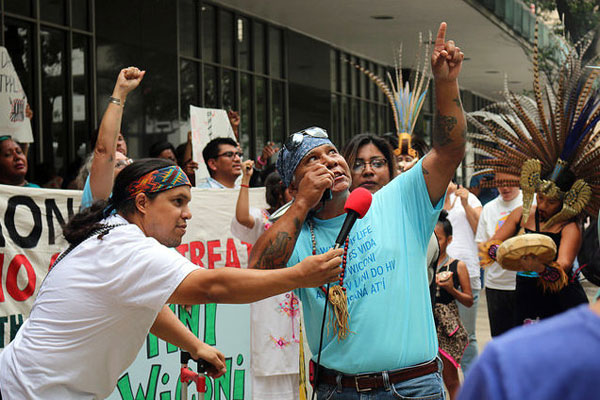- South Texas Students Meet Accordion Music Icons Los Tigres Del Norte In Edinburg Thanks To Khs America/Hohner Alianza Académica Initiative
- Fragile Planet Offers a Nighttime Wildlife Experience
- Falcons Soccer Off & Running
- Cameron County Receives Funds to Improve Two Parks
- Falcons Complete First Half of 32-6A
- School District to Help out Victims of California Wildfires
- Sand Castle Days Continued Despite Unexpected Weather
- Ready for District
- Discussion of Garbage Dumpster Rates, Agreements Between State & City on Highway Regulations, and More
- 31st Annual Shrimp Cook-Off is Right Around the Corner
Natives, Environmentalists Protest in Houston Over Pipeline
- Updated: October 28, 2016

Native Americans and environmental groups protest at the Houston headquarters of Energy Transfer Partners, the contractor building Dakota Access and other pipeline projects. Photo: Grassroots Global Justice Alliance
by Mark Richardson
HOUSTON – A coalition of environmental groups and Native American activists has taken protests over a controversial pipeline to the Houston offices of the company building the project.
Dressed in traditional tribal garb, chanting and dancing to native drums, dozens gathered this week at the headquarters of Energy Transfer Partners, the contractor building the Dakota Access Pipeline, to support the Standing Rock Sioux Tribe’s efforts to halt construction on the project.
Donna House, an organizer with the Navajo Chapter of the Black Mesa Water Coalition, said they gathered in Houston because it is the headquarters of the oil industry.
“Houston has had companies that have had incredibly destructive impact on Indian lands and in Native American natural resources, our sacred sites, our water,” she said.
Protests in North Dakota, some of which have turned violent, have been aimed at blocking the 1,200-mile oil pipeline, which would cross native lands. In response to the Houston protest, Energy Transfer Partners issued a statement saying they are taking all necessary steps to protect cultural resources, the environment, and public safety.
In addition to Dakota Access, the groups in Houston were protesting another of the company’s projects, the Trans-Pecos Pipeline in West Texas. House says that project runs through ancestral tribal lands and would endanger environmentally sensitive areas.
“It’s important that Texas recognize that not only that they have the fossil-fuel industry here that’s destructive, but also a pipeline that’s going through lower income communities, people of color communities, and indigenous territories,” she added.
After protests turned violent in North Dakota, a federal judge granted an injunction in September that temporarily stopped construction, but it was lifted last week. The federal government asked the company to voluntarily halt construction, but it has refused.
